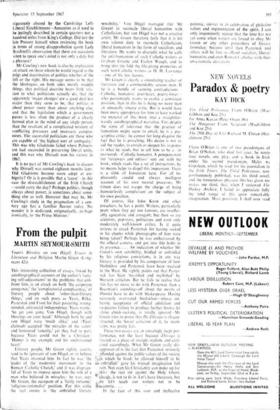From the pulpit
MARTIN SEYMOUR-SMITH
This interesting collection of essays, linked by autobiographical accounts of the author's 'vary- ing self-adjustments' to the problems that con- front him, is an attack on both 'the corporate arrogance,' the 'conspiratorial complacency,' of literary people about 'other-than-literary things,' and on such poets as Yeats, Rilke, Pasternak and Frost for their posturing, wrong- minded, anti-social independence. Yeats wrote: 'So get you gone, Von Hilgel, though with blessings on your head.' Although both he and von Htigel were 'much alike,' and ;Yeats claimed) accepted 'the miracles of the saints' and honoured 'sanctity,' yet they had to part, because Yeats could not be a Christian : 'Homer is my example and his unchristened heart.'
Literary people, Mr Green rightly asserts, tend to be ignorant of von Hugel, or to believe that Yeats invented him. In fact he was 'the leader of the modernist movement in the Roman Catholic Church,' and it was disgrace- ful of Yeats to impose upon him the role of a man who believed in miracles: he was, says Mr Green, the occupant of a 'fairly extreme,' 'religious-rationalist' position. For this critic the real enemy is 'the unbridled literary
sensibility.' Von Hiigel managed. for Mr Green) to reconcile liberal humanism with Catholicism, but von Hugel was not a creative artist; Mr Green therefore feels that it is his own solemn duty to reconcile Catholicism, liberal humanism in the form of socialism, and literature. He wants to discredit what he calls the anti-humanism of such Catholic writers as Graham Greene and Evelyn Waugh, and to bring into the fold the life-giving properties of such non-Catholic v.riters as D. H. Law rence ----one of hiS few heroes. •
Mr Green is clearly a stimulating teacher of literature and a commendably serious man. If he is a bundle of seeming contradictions Catholic, humanist; poet-hater, poetry-(over-- who passionately wants to evolve a consistent position, then in this he is being no more than an unusually sincere critic. But it would have been more appro`priate for him to have worked the material of this book into a straightfor-
. wardly autobiographical narrative. For, despite the sense of tolerance that the practice of humanism might seem to entail, he is a pre- scriptive critic: he cannot for long disguise the fact that he is preaching. His desire is not to aid the reader, to enrich or deepen his response to what he reads, but to tell him to be a ---in two words--Catholic humanist. A pompous note for 'reviewers and editors' sent out with the book, which reads like a set of instructions, by no means helps to dispel this impression. There is a stink of Jansenism here. For all his pleasantly candid and always intelligent account of his own mental processes. Mr Green does not escape the charge of being
—humourlessly complaisant on the subject of his own position.
Of course,. like John Knox and other preachers, he has a point. Writers, particularly poets when they get too famous, are insuffer- ably egocentric and arrogant; but then so arc scientists, pop-stars, politicians and even only moderately well-known critics. Is it quite serious to attack Pasternak for having sucked in his cheeks while photographs of him were being taken? Perhaps he was embarrassed by the official camera, and got into this habit in its presence.... An indication of whether Mr Green's own sensibility, bridled or unbridled by his religious convictions,- is in any way literary is provided by his comparison of how Sholokhov and Pasternak have been received in the West. He rightly points out that Paster- nak has been 'mystified and mythitied' by Western criticism. But he fails to realise that this has no more to do with Pasternak than a Baconian's soundings-off about the merits of Hamlet have to do with Shakespeare. Having nervously over-rated Sholokhov—whose un- heroic acceptance of official adulation and suspicious failure to produce further books, let alone cheek-sucking, is totally ignored—Mr .. Green tries to prove that Dr Zhivago is ill-con- structed; the Soviet criticism of it, he main- tains, was pretty fair.
These two essays are an amazingly inept per- formance, not the least because Zhivago is treated as a piece of straight realism, and criti- cised accordingly. What Mr Green really dis- approves of is the fact that Pasternak seriously offended against the public values of the society a. %in which he lived; he allowed himself to be
4:unbridled,' gave his wicked imagination full rein. Not even his Christianity can make up for
• this: the real sin against the Holy Ghost,
• eleariy, is not to fit in. Let's have literature, but do let's teach our 'writers not to be *eccentric.... . - In the face of this sour and ineffective
polemic, sinister in its celebration of philistine values and regimentation of the spirit, I can only impenitently rejoice that the time has not yet come when writers arc forced to obey Mr Green or any other prescribers of literary formulae; because until then Pasternak and others will be free to offend socialists, liberal- humanists and even Roman Catholics with their unsv stematic des ia lions.






























 Previous page
Previous page